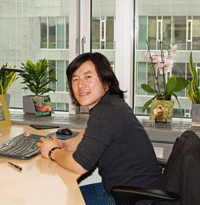RoboLaw at UCPH: Embracing the digital frontier
A self-proclaimed “Academic without a home,” Dr. Hin-Yan Liu has roots in Hong Kong, Canada, Britain and Italy. He now teaches RoboLaw at the University of Copenhagen; the interplay between robotics, artificial intelligence and law.
 Having been trained around the world, Dr. Liu does not understand regional constraints to research or education. He does not feel limited to a certain area or jurisdiction, and his legal research is now focused on new trajectories of an otherwise ancient profession: law. For Hin-Yan, bringing international students together in his classroom has generated many new insights. Drawing on their social and cultural contexts, students will express different perspectives on the topics covered in RoboLaw. Such different perspectives offer critical views, which are crucial when exploring new academic territories.
Having been trained around the world, Dr. Liu does not understand regional constraints to research or education. He does not feel limited to a certain area or jurisdiction, and his legal research is now focused on new trajectories of an otherwise ancient profession: law. For Hin-Yan, bringing international students together in his classroom has generated many new insights. Drawing on their social and cultural contexts, students will express different perspectives on the topics covered in RoboLaw. Such different perspectives offer critical views, which are crucial when exploring new academic territories.

Dr. Hin-Yan Liu
RoboLaw: Artificial Intelligence, Robotic Technologies and Law
The emerging field of RoboLaw covers a wide range of topics, and Hin-Yan’s course is divided into three broad sections. The first discusses the overarching conceptual framework and situates the course within the discourse in cyberlaw. The second progresses to concrete scenarios, including the debates over development and deployment of autonomous weapon systems in armed conflict, the structural pressures on human rights law and questions of power and control over artificial intelligence. The third section explores more theoretical and horizon issues involved in the governance of superintelligence, whether biologically-inspired or derived intelligences give pause to legal and policy proposals, and whether such technologies signal the end of law’s role in regulation. The course concludes with student presentations in groups where the students cluster around common issues, with feedback paving the way for their individual written assignments.
The international classroom
What is particularly interesting about RoboLaw from a didactic point of view is the fact that it is less codified than many other legal subjects. In a classroom as international as Hin-Yan’s, this allows for new angles and creative insights. Students from all over the world bring forth their views, engaging with the subject matter through their personal perspectives and skills. This allows for multifaceted approaches to the same object of study, vastly improving the collective understanding that results from the course.
A brave new world
In a world with driverless cars, militarized artificial intelligence and sex robots, how does Hin-Yan see the future? “A pessimist would get too depressed working with this stuff, so you have to keep a positive outlook,” Hin-Yan says. “We have the technology we need to solve all the world’s problems, we just cannot agree on how to do it. What we need is not more technology, but more human interaction. That’s why internationalisation is so important”.
Contact
Clara Nielsen
International Coordinator
clara.nielsen@adm.ku.dk
